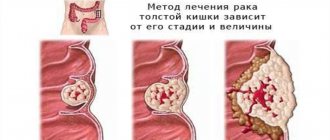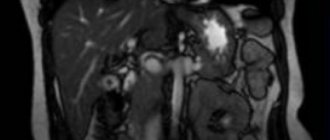- Types and classification of colon cancer
- Causes, risk factors for colorectal cancer
- Symptoms of bowel cancer
- Diagnostic methods
- What is screening? How effective is it for colon cancer?
- Treatment methods for bowel cancer
- Prediction of survival after treatment for colon cancer
The human intestine can be divided into three parts:
- The small intestine consists of the duodenum (starting from the stomach), jejunum and ileum.
- The large intestine consists of the cecum, ascending, transverse and descending colon, sigmoid colon.
- The rectum is the final section of the intestine, which serves for the accumulation and removal of feces.
When people say “bowel cancer,” they usually mean tumors of the colon and rectum—the so-called colorectal cancer . This article will focus on colon cancer. There is a separate article on the site about malignant tumors of the rectum.
Some numbers and facts:
- Colon cancer is one of the most common cancers in many countries.
- Most often (in 94% of cases) the disease is diagnosed in people over 50 years of age. Up to 59% of cases are diagnosed in people over 70 years of age.
- Cancer is a name given to malignant tumors that develop from the mucous membrane. In the intestine they are most often preceded by polyps.
- Approximately one in 14 men and one in 19 women will develop colorectal cancer during their lifetime.
- Currently, colon cancer is quite treatable. If the tumor is diagnosed at an early stage, the chances of remission are high.
Types and classification of colon cancer
The majority of malignant tumors of the colon (approximately 96% of cases) are adenocarcinomas. They come from glandular cells of the mucous membrane that produce mucus. Depending on the microscopic structure, adenocarcinomas are divided into mucinous and signet ring cell.
There are 5 stages of colorectal cancer:
- Stage 0 : the tumor is in the upper layers of the mucous membrane. This is the so-called cancer in situ.
- Stage I : The tumor grows deeper into the intestinal wall, but does not penetrate through it.
- Stage II : the tumor has grown through the thickness of the intestinal wall, but has not spread to nearby (regional) lymph nodes.
- Stage III : Tumor cells have spread to regional lymph nodes.
- Stage IV : Tumor that has metastasized. In colorectal cancer, metastases are most often found in the liver, peritoneum, ovaries, and lungs.
Specialists
The colonoscopy procedure in our Clinic is performed by the head of the department of diagnostic and therapeutic endoscopy, Ph.D. Pavel Vladimirovich Pavlov is a specialist who has been performing this research since 2003, and also performs all known endoscopic intraluminal operations on the intestine: polypectomies, mucosectomies, dissections in the submucosal layer, bougienage, balloon dilatations, stenting and others. Pavel Vladimirovich has extensive experience in the diagnosis and treatment of early cancer not only of the colon, but also of the entire digestive tract.
Candidate of Medical Sciences also deals with diagnostics and therapeutic interventions on the intestine. Afanasyeva Aigul Fanzirovna is a doctor who has devoted herself to endoscopy since 2003, performing most endoscopic intraluminal interventions on the digestive tract and has deservedly established herself as a brilliant specialist.
Causes, risk factors for colorectal cancer
It is impossible to name the exact unambiguous reason why a mutation arose in the cell and it began to multiply uncontrollably. But there are numerous risk factors that increase the likelihood of developing bowel cancer:
- Age . The risk of getting sick is highest after 70 years of age. The disease is very rare among people under 50 years of age.
- Burdened family analysis . The risk of getting the disease is higher among people who have close relatives diagnosed with bowel cancer.
- Some hereditary conditions . For example, familial adenomatous polyposis is responsible for approximately 1% of colorectal cancer cases. A person suffering from this condition and not receiving treatment will almost certainly develop a malignant tumor by the age of 40.
- Benign polyps . In most cases, malignant tumors in the intestine develop precisely from polyps, which are found by the age of 60 in every third person. Not every polyp transforms into cancer; this is a rather complex and lengthy process.
- Chronic inflammation in the intestine . Crohn's disease and ulcerative colitis increase the risks by approximately 70%.
- Some diseases . For unknown reasons, diabetes mellitus, gallstone disease, and acromegaly increase the risk of colorectal cancer.
- Excess body weight . In approximately 13% of cases, excess weight played a role in the development of bowel cancer.
- Unhealthy eating . The diet of many modern people contains a large amount of meat, semi-finished products, and very few vegetables, fruits, legumes, and grains. This increases the risk of certain cancers and other diseases.
- Bad habits . People who smoke and drink alcohol frequently are more likely to suffer from bowel cancer.
Symptoms of bowel cancer
Like any cancer, colon cancer is insidious. It grows silently for a long time, without causing any symptoms. But even when symptoms appear, it is impossible to clearly diagnose a malignant tumor from them, because they strongly resemble the manifestations of other diseases of the digestive system:
- Pain, periodic painful cramps in the abdomen.
- Changes in the nature of the stool, the appearance of blood and mucus in it.
- Frequent constipation, diarrhea.
- Increased gas formation, bloating.
- Decreased appetite.
- Weight loss for no apparent reason.
In order not to “miss” the disease, it is important to be attentive to your well-being. You need to pay attention to any unusual symptoms that persist for a long time. It is always better to visit a doctor again and get checked.
Fecal occult blood test and stool immunochemical test
These cancer screening tests are usually repeated annually.
Pros:
- Collecting stool samples can be done at home.
- There is no need to cleanse the intestines.
- There is no need for sedation.
Minuses:
- The tests are unable to detect some polyps and cancers.
- You may have to avoid eating certain foods (meat, for example) and medications for several days.
- If the test reveals a positive blood test, additional tests may be needed to determine the source of the bleeding.
- The test may suggest abnormality when there is no abnormality (false positive).
Diagnostic methods
If colon cancer is suspected, the first step is a colonoscopy . During the procedure, a special instrument in the form of a thin, long flexible tube is inserted into the large intestine through the anus - a colonoscope . At the end of the colonoscope there is a miniature video camera and a light source. The enlarged image is transmitted to the screen of the device, so the doctor has the opportunity to examine the intestinal mucosa from the inside.
Colonoscopy helps to detect any pathological formations on the mucous membrane of the large intestine: malignant tumors, polyps, ulcers, areas of inflammation. During the study, you can obtain a piece of tissue and send it to the laboratory for analysis.
After a malignant tumor is discovered during a colonoscopy, it is often necessary to clarify some details. The doctor needs to find out how far the neoplasm has grown outside the intestine, whether it has spread to regional lymph nodes, and whether there are distant metastases. For this, additional diagnostic methods are used: CT, MRI, PET, x-ray of bones and chest, ultrasound of the abdominal organs.
A complete blood count helps identify anemia. Intestinal bleeding is diagnosed using a stool occult blood test. With colon cancer, the levels of some tumor markers , but for the purpose of diagnosing a malignant tumor, such a study is not informative. Tumor marker levels are checked over time to assess the effectiveness of treatment.
CT colonography
This method is also called virtual colonoscopy. The study is carried out using a computed tomograph. Before scanning, air is pumped into the appropriate area of the intestine to straighten the folds. After this, a series of images are taken, on the basis of which a 3-dimensional image of certain areas of the intestine is constructed. CT colonography is more comfortable and safe for the patient, but cannot always replace endoscopic examination, since it does not make it possible to perform a biopsy.
What is screening? How effective is it for colon cancer?
Since intestinal cancer has no symptoms in the early stages, the diagnosis is often made too late, when the tumor has already spread throughout the body. Because of this, the prognosis worsens. Screening helps in early diagnosis - studies that are regularly carried out on all people at risk.
The main screening method for colorectal cancer is colonoscopy. It is recommended to undergo it once every 10 years for all people over 50 years of age. If a person has additional risk factors, such as Crohn's disease or familial adenomatous polyposis, the doctor will recommend starting screening at an earlier age.
Treatment methods for bowel cancer
A patient diagnosed with colorectal cancer is treated by a team of specialist doctors. It may include: oncologist, surgical oncologist, chemotherapist, radiation diagnostics doctor, gastroenterologist, psycho-oncologist. The choice of treatment tactics is carried out taking into account several factors:
- Stage and type of cancer.
- Location of the tumor in the intestine.
- Age, health status of the patient.
- Concomitant diseases, complications caused by the tumor.
Surgical treatment of bowel cancer
Surgery is the main, most radical method of treating colon cancer. If the tumor is caught at an early stage, it can be removed along with some of the surrounding tissue. The sample is sent to the laboratory, where pathologists examine the appearance of the cells and the resection margin under a microscope. If the resection margin contains tumor cells, or it is found that the cells are poorly differentiated and have almost completely lost their normal features, the doctor may prescribe a repeat operation. Part of the intestine that may contain tumor cells is removed to help prevent recurrence.
Often you have to perform a resection ( colectomy ) - remove part of the intestine containing the tumor. The remaining parts of the intestine are connected - an anastomosis . Sometimes it is not possible to perform an anastomosis right away. In such cases, a colostomy or ileostomy : the end of the colon or ileum is brought to the surface of the skin, respectively. Feces will temporarily pass through the formed hole. After some time, a second operation is performed: the colostomy or ileostomy is closed, the ends of the intestine are connected.
In cases where radical surgery is impossible and the tumor blocks the intestinal lumen, palliative interventions are resorted to. Their goal is to ensure normal passage of stool and improve the patient’s condition:
- Intestinal stenting . A stent is installed into the intestinal lumen - a hollow cylindrical frame with a mesh wall.
- Permanent colostomy . If the lower part of the colon is blocked by a tumor, a colostomy is brought to the surface of the skin to pass stool.
Chemotherapy for colon cancer
Chemotherapy for colorectal cancer comes in different types:
- Adjuvant : after surgical treatment, to prevent relapse.
- Neoadjuvant : given before surgery. Helps reduce the size of the tumor, simplify its removal, convert inoperable cancer into operable cancer, and reduce the risk of relapse after surgery.
- Palliative : prescribed as an independent, main method of treatment, in late stages, when radical surgical treatment is impossible. This chemotherapy helps improve the patient’s condition, reduce symptoms, and increase life expectancy.
For colon cancer, chemotherapy drugs such as capecitabine, 5-fluorouracil, oxaliplatin, and irinotecan are used. As a rule, treatment is carried out with a combination of 2-3 drugs.
Targeted therapy
In recent decades, much has become known about the processes that occur in malignant tumors at the molecular level. Scientists have identified many genes whose mutations are responsible for causing cancer. Molecules are known that allow cancer cells to survive and multiply uncontrollably. Drugs have been created that can block these molecules - they are called targeted drugs .
Three groups of targeted drugs are effective for colon cancer:
- VEGF blockers are substances that cancer cells produce to stimulate the growth of blood vessels and provide themselves with oxygen and nutrients. This group includes drugs: bevacizumab, ramucirumab, ziv-aflibercept.
- Blockers of EGFR, a receptor protein that is present in large quantities on the surface of cancer cells and, when activated, stimulates their growth. This group of drugs includes: cetuximab, panitumumab.
- Inhibitors of kinases - signaling enzyme proteins. Regorafenib belongs to this group.
Targeted drugs are used for colorectal cancer in advanced stages.
Immunotherapy
Immunotherapy is another modern direction in the treatment of malignant tumors. It uses the resources of the immune system to fight cancer cells.
Normally, the immune system is constantly forced to restrain itself: if immune cells behave too aggressively, serious autoimmune conditions can develop. checkpoints as a “brake pedal . Cancer cells know how to use checkpoints to their advantage. They block the activation of immune cells and thus protect themselves from their aggression.
Currently, there is a special class of immunotherapy drugs - checkpoint inhibitors . They reactivate the immune system, causing it to attack the tumor tissue.
For colorectal cancer, drugs from the group of checkpoint inhibitors are used: nivolumab (Opdivo) and pembrolizumab (Keytruda).
Radiation therapy for colon cancer
Radiation therapy, like chemotherapy, for colon cancer is used before, after surgery, and for palliative purposes in late stages. In addition, irradiation of the tumor can be performed directly during surgery.
Sometimes radiation therapy is prescribed in combination with chemotherapy - this is the so-called chemoradiotherapy. It is highly effective, but is accompanied by more serious side effects.
Prediction of survival after treatment for colon cancer
The prognosis for cancer patients is assessed by five-year survival rate, an indicator that indicates the number of patients remaining alive for 5 years. This indicator depends on the stage; for colon cancer it is:
- At stage I - 92–95%.
- At stage II - 63–87%.
- At stage III - 53–69%.
- At stage IV - 11%.
| More information about treatment at Euroonco: | |
| Oncologist-gastroenterologist | RUB 5,100 |
| Proctologist-oncologist | RUB 5,100 |
| Chemotherapy appointment | RUB 6,900 |
| Emergency oncology care | from 12,100 rub. |
| Palliative care in Moscow | from 44,300 rubles per day |
| Radiologist consultation | RUB 11,500 |
Book a consultation 24 hours a day
+7+7+78
What should you watch out for during a colonoscopy?
Colonoscopy has become a fairly popular procedure, which is now performed in various clinics. Despite its widespread use, colonoscopy is an invasive procedure that should only be performed by an experienced and qualified specialist using modern high-tech equipment.
Side effects of a “poor” colonoscopy:
- Damage (perforation) of the colon is an extremely rare, but very dangerous complication that requires immediate surgical correction and most often occurs when the medical staff is extremely poorly prepared, excessive haste, and the desire to perform the study “fastest in Moscow.”
- Bleeding after colonoscopy is also an extremely rare complication and has the same causes as perforation.
- Improper removal of the polyp means the persistence of residual tumor, which entails progression of the disease, while the patient is completely confident in his recovery.
- Incorrectly selected anesthesia causes difficult awakening, nausea, dizziness and even vomiting, headaches, general weakness, and temporary loss of performance.
Be careful when choosing a clinic for a colonoscopy, beware of “counterfeits”. The study must be carried out by an experienced and qualified specialist.









